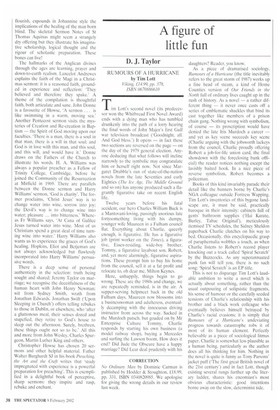The wit, wisdom and passion of the pulpit
James Bell
BEST SERMONS EVER selected by Christopher Howse Continuum, £16.99, pp. 201, ISBN 0826456855 Christopher Howse reckons that there is a contemporary hunger for real spiritual food, there being a dearth of appropriate sermons. Within the pleasing covers and attractively printed pages of this book there is much to nourish mind and heart, intellect and will — gourmet morsels for the erudite and good staples for the rest of us. An extravagant title, but hardly a vainglorious claim, this is a connoisseur's choice. Despite felicitous modifications some of the sermons are not readily accessible to generations unused to concentrated reading or listening attentively.
In the general introduction and in the particular preludes to each section Howse sets the scene historically; he prunes, removes archaisms and gives helpful advice.
Howse begins with St Peter's Pentecost Sermon, a gifted proclamation to his own people of the Lord Christ. To the men of Judaea and Israel he presents the saving Faith. With fitting parallelism in the arrangement of the sermons, which St Luke might admire, the last is by St Peter's present successor, Pope John Paul II. He too addresses his fellow countrymen but in Poland at Pentecost in 1979, Again the history of salvation comes alive in national and personal experience.
Between these two apostolic preachers there are sermons reflecting scholarship, spiritual discipline and strong, sensitive faith. St John Chrysostom and St Augustine attract by rhetorical skill, sensitivity, and understanding the emotions and hopes of their communities. We have drama in Cluysostom, rebuking the congregation for its want of loving kindness to the conniving eunuch Eutropius who is seeking cathedral sanctuary. St Augustine, with apt flourish, expounds in Johannine style the implications of the healing of the man born blind. The skeletal Sermon Notes of St Thomas Aquinas might seem a strangely dry offering hut they illustrate his imaginative scholarship, logical thought and the rigour of scholastic preparation. These bones can live!
The hallmarks of the Anglican divines through the ages are learning, prayer and down-to-earth realism. Lancelot Andrewes explains the faith of the Magi in a Christmas sermon: it is a reasoned faith, grounded in experience and reflection: They believed and therefore they spake.' A theme of the compilation is thoughtful faith, both articulate and sane. John Donne is a favourite of Howse, 'A sermon . is like swimming in a warm, moving sea.' Another Pentecost sermon visits the mysteries of Creation and Re-creation in Baptism — the Spirit of God moving upon our faculties. 'There is a man, there is a soul in that man, there is a will in that soul; and God is in love with this man, and this soul, and this will, and would have it.' Donne draws on the Fathers of the Church to illustrate his words. H. A. Williams was always a popular preacher as a Fellow of Trinity College, Cambridge, before he joined the Community of the Resurrection at Mirfield in 1969. There are parallels between the Donne sermon and Harry Williams' sermon, 'God is charity'. The former proclaims, 'Christ Jesus' way is to change water into wine, sorrow into joy; the Devil's way is to change wine into water; pleasure ... into bitterness.' Whereas Fr Williams says, 'At Cana of Galilee Jesus turned water into wine. Most of us Christians spend a great deal of time turning wine into water.' Harry Williams also wants us to experience the graces of God's healing. Hopkins, Eliot and Betjeman are not always acknowledged but flawlessly incorporated into Harry Williams' persuasive words.
There is a deep sense of personal authenticity in the selection: truth being sought and shared; Jeremy Taylor on marriage; we recognise the deceitfulness of the human heart with John Henry Newman; wit from Sydney Smith, wrath from Jonathan Edwards. Jonathan Swift ('Upon Sleeping in Church') offers telling rebukes to those in Dublin, or elsewhere, who 'after a gluttonous meal, their senses dozed and stupefied, they retire to God's house to sleep out the afternoon. Surely, brethren, these things ought not so to be.' All this and more from John Wesley, Charles Spurgeon, Martin Luther King and others.
Christopher Howse has chosen 20 sermons and other helpful material. Father Walter Burghardt SJ in his book Preaching, the Art and the Craft writes that 'study impregnated with experience is a powerful preparation for preaching'. This is exemplified in a delightful book of perceptive, sharp sermons: they inspire and rasp, rebuke and enchant.







































































 Previous page
Previous page